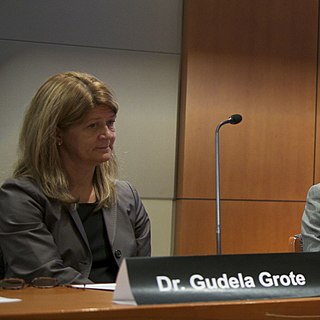Erich Kirchler (born 4 November 1954) is an Italian-Austrian psychologist and Professor of Economic Psychology at the University of Vienna. [1]
His research covers the areas of work, organizational, consumer and economic psychology, in particular tax psychology and money management in private households. He is best known for his research on tax behavior and tax morale and his "slippery slope framework", which has been adopted by a number of tax administrations.
Kirchler was born in Sand in Taufers in northern Italy. In 1974, he began studying architecture at the Technical University of Vienna and psychology and human anthropology at the University of Vienna. His doctoral dissertation focused on "Changes in concepts through learning processes – A contribution to cognitive dynamics" (German : Veränderung eines Begriffsraumes durch Lernprozesse – Ein Beitrag zur kognitiven Dynamik). After his graduation in 1979, he was employed at the University of Linz Institute of Education and Psychology. Under the supervision of Hermann Brandstätter, he received his habilitation in psychology in 1989 from the University of Linz, Austria. Since 1992, he has served as professor of applied psychology (economic psychology) at the Faculty of Psychology, University of Vienna, where he retired in 2020. Since 2010 he is also guest professor at the Vienna University of Economics and Business (as part of the DIBT: Doctoral Program in International Business Taxation). [2]
Since 1992, Kirchler has taken on various administrative roles, first at the Institute of Psychology and afterwards at the Faculty of Psychology. He has served as Chair of the Department of Applied and Clinical Psychology, (Vice-) Chair of the Institute of Psychology and as Vice-Dean of the Faculty of Psychology. He was vice-chair and chair of the Department of Applied Psychology: Work, Education, Economy.
During his time in Vienna, he has received appointments for full professorships (C4) at the University of Erlangen-Nuremberg and the University of Cologne in Germany, and has also taught at several international universities as a visiting or guest professor. Besides being guest professor at the Vienna University of Economics (https://www.wu.ac.at/), since 2020, he is Senior Fellow at the IHS-Institute for Advanced Studies, Vienna (https://www.ihs.ac.at/).
He has served as a reviewer for Social Sciences at the Austrian Science Fund (FWF) for many years and has also been a member of the Austrian PR-Ethics Counsel. He has been President of the International Association for Research in Economic Psychology (IAREP), of the Austrian Society of Psychology (ÖGPs) [3] and of Division 9 (Economic Psychology) of the International Association of Applied Psychology (IAAP). 2022 Research.com ranked him #536 on the Economists-list worldwide and #2 in Austria (https://research.com/scientists-rankings/economics-and-finance).
Together with Erik Hölzl (University of Cologne), Erich Kirchler was the editor of the Journal of Economic Psychology from 2010 to 2015. [4] He is also co-editor of the International Taxation Research Paper Series and serves on the editorial boards of several journals and advisory boards. Together with Felix Brodbeck and Ralph Woschée, he has been the editor of the practical and scientifically founded book series "Die Wirtschaftspsychologie" ("The Economic Psychology") [5] since 2014, which is aimed at students, practitioners, and university professors.
{{cite book}}: CS1 maint: location missing publisher (link){{cite book}}: CS1 maint: location missing publisher (link){{cite book}}: CS1 maint: location missing publisher (link){{cite book}}: CS1 maint: location missing publisher (link){{cite book}}: CS1 maint: location missing publisher (link)
Sand in Taufers is a comune mercato in South Tyrol in northern Italy.
Gerhard Scherhorn was a German Professor and economist.
Jochen Fahrenberg is a German psychologist in the fields of Personality, psychophysiology and philosophy of science.

Erich Schröger is a German psychologist and neuroscientist.

Klaus D. Kubinger, is a psychologist as well as a statistician, professor for psychological assessment at the University of Vienna, Faculty of Psychology. His main research work focuses on fundamental research of assessment processes and on application and advancement of Item response theory models. He is also known as a textbook author of psychological assessment on the one hand and on statistics on the other hand.
Architectural and environmental psychology developed within the German-speaking world in the 1970s. In 1972, W.F.E. Preiser stated: “What is of special interest to environmental psychologists are the rules by which person-environment relationships are determined and adjustments to changing environmental conditions are enabled within cultural realms. Designers of environments, in particular architects and city planners, need measurements on how the variables they have manipulated affect users.” Early concepts revolved around the psychosocial roles of public and private space, interpersonal conflict, quality of living, and noise pollution. Later concepts explore the relationship between built environments and climate change.
Hans-Ulrich Wittchen is a clinical psychologist, psychotherapist and epidemiologist. He has been a head of the Institute of Clinical Psychology and Psychotherapy and the Center of Clinical Epidemiology and Longitudinal Studies (CELOS) at the Technische Universität Dresden. Since 2018, he is leading the research group "Clinical Psychology and Psychotherapy Research" at the Psychiatric Clinic of Ludwig-Maximilians-Universität München and directs the IAP-TU Dresden GmbH in Dresden.
Felix Tretter is an Austrian psychologist and psychiatrist. From 1992 to 2014 he was head of the addiction department of the Isar-Amper-Klinikum München-Ost, formerly known as Bezirkskrankenhaus Haar, Bavaria, Germany. His scientific work has emphasis on modelling of psychophysical scenarios in schizophrenia and addiction research with methods of systems science.
Rainer Mausfeld is a retired German professor of psychology at Kiel University. He did research on the psychology of perception, cognitive science, and the history of psychology. Since 2015, he has published on manipulation in media and politics and the transformation of representative democracy to neoliberal elite democracy.
Edith Saurer was an Austrian historian, university professor at the University of Vienna, scientific author, and publisher. She is regarded as a central cofounder and advocate of feminist historiography in Austria. She received the Käthe Leichter Prize, Gabriele Possanner State Prize, and the Golden Medal for her services to the State of Vienna.

Teresa Präauer is an Austrian writer and visual artist.
Josef Ehmer was an Austrian historian and professor emeritus at the University of Vienna.

Winfried Rief (born 12 May 1959) is a German psychologist. Since 2000 he has been a professor of clinical psychology and psychotherapy at the University of Marburg. Rief's research examines the psychological factors involved in the development, maintenance and management of physical complaints, including investigations of somatic symptom disorders and placebo effects. Rief is the founding editor of the academic journal Clinical Psychology in Europe.

Gudela Grote is a German psychologist and academic. She was educated in Germany and the United States, and established her career in Switzerland.
.

Maria Dorothea Simon was an Austrian psychologist and scholar of social work. Born into a Jewish family in Vienna near the end of the First World War, she was educated in Austria and Czechoslovakia but emigrated to London after the latter was annexed by Germany in 1938. While in the United Kingdom, she worked at the Hampstead Nurseries, an experimental child care centre run by the psychoanalyst Anna Freud. She was married to the jurist and resistance activist Joseph Simon.
The International Association for Research in Economic Psychology, usually abbreviated IAREP, is an interdisciplinary learned society concerned with all areas in which the disciplines of economics and psychology overlap, including behavioural economics, experimental economics and decision making among others. As stated on their mission, IAREP is engaged in the advancement and dissemination of knowledge regarding economic psychology for the benefit of society by connecting people, data and ideas. It was founded in 1982, as a successor to an informal organization, the European Group for Research in Economic Psychology, which first met at Tilburg University in 1975. IAREP's membership has remained principally European; it works in close collaboration with the Society for the Advancement of Behavioral Economics (SABE), which is centred in North America. The different titles of the two organizations reflect the fact that one was founded mainly by psychologists, the other mostly by economists, but in practice their interests overlap greatly.

Michael John is an Austrian historian and exhibitions-curator, internationally known for his research on European and Jewish migration, and on Nazism.

Hartmut Seifert (born 23 January 1944 in Tilsit is an influential German labor market and working time researcher, former leader of the Institute of Economic and Social Research of the Hans Böckler Foundation and scientific correspondent for the Japan Institute for Labour Policy and Training, Tokyo.
Felix Claus Brodbeck is a German psychologist and professor of economic and organizational psychology at Ludwig Maximilian University (LMU) in Munich. His main areas of focus are work and organizational psychology, intercultural psychology, as well as economic psychology.